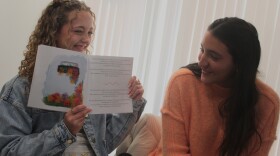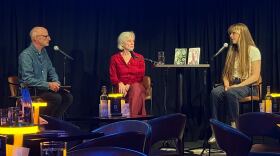New Hampshire lawmakers are considering a bill that would give state officials more say in which books are appropriate for students.
The Senate passed SB 523 by a Republican majority earlier this month. It would allow parents to appeal their book complaints to the State Board of Education.
The bill has caught the attention of New Hampshire-based author Jodi Picoult who has been an outspoken critic of book bans across the country. Her books have been pulled off of school library shelves in Florida, Iowa and South Carolina, and challenged in many more states, including New Hampshire.
Transcript
You’ve been an author for over 30 years. When did book banning first get on your radar?
I remember book bans sort of cropping up every now and then. When years ago, “My Sister's Keeper” was published, I remember it was banned somewhere, [in] some school district, because there is a gay bartender in it. And you know, they would come and go. But the proliferation of book bans that we're seeing today really began after COVID. It's not just a random school here or there. It's a very coordinated effort to remove titles that they don't want in front of children. The problem is, of course, that their statement that they don’t want their children reading these books does not apply to anyone else's children. Any parent can make a decision for their own child, but when you start making decisions for other children, you start running into real limitations on the freedom to read.
As you’ve said, often these efforts are led by parents. You’re also a parent, what is that like for you to watch, and what role should parents play in this?
Oh my gosh, look, my kids are all grown up. They can make their own decisions. But when they were little, yeah, I absolutely monitored what they watched, what they saw online, what they read. I think that is the job of a parent. If they brought me a book that I thought was going to be an emotional challenge for them, or was about a topic that I thought we might need to discuss, I would read it, and then we would have a conversation. That is the beauty of literature, right? It allows you to discuss topics that are thorny and difficult without it feeling a little too close to the bone because it's happening about a, quote, fictional person.
But we know that there's so many proven studies that literature provides an escape for kids who need it, who are in restrictive situations. We know that it provides mirrors to kids who need to see themselves represented in other forms of media to know that they're not alone, they're not the only one who feels like this. And when you start removing those books from a school library, you are not protecting children. You are preventing them from having tools to survive in an increasingly complex world.
You have a new book [“By Any Other Name”] coming out soon. Was book banning at all on your mind during the process of writing that book?
During the process of writing that particular book, it was not. Because it's much more about gender discrimination in the arts and how it's lasted for over 400 years. It was about different kinds of restrictions.
One of the things that shocked me the most about the book bans when they started happening—in addition to writing books, I'm now also writing librettos for musicals. And I happened to be in the [United Kingdom] working on an adaptation of Marcus Zusak's book “The Book Thief,” which is about Nazi Germany. Our director was very insistent that we see a real book burned on stage every night, because she thought that it would be shocking to the audience. And so there I was on my computer, looking at the script and watching actors burn a book in front of me as they're dressed like Nazi soldiers. And I got a notification from PEN America, which tracks many of these book bans, to let me know that in Martin County, Florida, 20 of my books had been banned in a single swoop. That to me, was just, it felt a little too on the nose.









